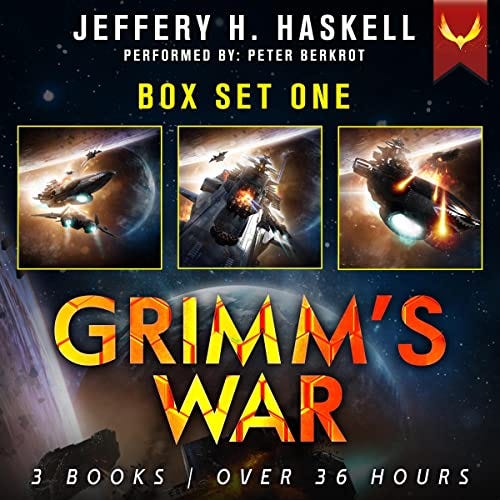Series Review: GRIMM'S WAR, books 1-3, by Jeffrey H. Haskell
"Firefly" meets the U.S. Navy, in SPAAAAAACE!
As well as Haskell did with his Full Metal Superhero series, he really hit his stride when he committed to military space opera in the Grimm’s War novels. 900 years in the future, mankind has spread across the galaxy, and boy is it a mixed bag. The novels focus on Jacob T. Grimm, a naval officer on a redemption quest with an outdated ship and a ragtag crew. I chanced an Audible credit on the 3-in-1 box set and was not disappointed.
The Story
Right out of the gate, we get a glimpse of young Naval officer Jacob T. Grimm on the deck of a warship in space, circa 2900 AD. In the middle of a conflict he orders his ship to fire on what he perceives to be an enemy vessel, only to find to his horror that it was full of families and children.
Extenuating circumstances keep him from being completely expelled from the Navy, but his name is now Mudd. Nobody is harder on him about it than himself. When he’s relegated to a rundown vessel at the edge of civilized space, he’s determined to whip his crew into shape and salvage what he can of his legacy, not due to his pride, but out of duty.
What follows across the first book and into the next two is a progression of escalating tasks that put Grimm and his crew up against space pirates, slavers, separatists, and more. While the first two were fine, they were also a little bit “safe” as far as serials go—here’s a bad guy, here’s what he wants, here’s why he’s dangerous, go stop him. The books were enjoyable but the only thing “fresh” about them were the worldbuilding.
Then the third book comes along, and Haskell pulls a Mission: Impossible—Ghost Protocol, where just as Grimm is starting to repair his reputation, he’s asked by high command to feign an insurrection and take his ship deep into enemy space on a rage mission against an existential threat. Politics prevent the Navy from attacking when they absolutely should. However, Grimm is uniquely positioned to do so, both in the eyes of the military and the public, so the question then becomes: will it work?
With all of the military fic I’ve been reading lately, this series was refreshing in its pacing; the prose was smooth and straightforward, while still demonstrating that it had heart, and wasn’t just rushed off. It helps that Grimm is an earnest character that I felt sorry far, and wanted to see him service his raging guilt for his error. Haskell struck the right balance between portraying Grimm as both resolved and sorrowful.
The Characters
As happens often in military fiction, many of the names run together, but the character types come through strong all the same. Grimm is a disgraced officer looking for redemption. On his new assignment, the 40 year-old Interceptor, he’s got a lot of lazy crewmen with bad habits, and the occasional low-ranking officer who sticks to the book and isn’t sure what to think of the new captain.
I’ve never been in the military, but I’ve worked in plenty of “ensemble” jobs where it’s easy to identify these personalities. The slacker. The wise cracker. The kiss-ass. The corporate climber. They all bounced off of Grimm in different ways, and he in turn influenced them to live up to their commission as service members.
I especially appreciated that Grimm was a man of faith; it plays a role in how he handles trials, without being so in-your-face as to reclassify the series under Christian fiction. He’s a little bit Captain Picard and a little bit Captain America, before either of those men had cemented their reputations.
The World
900 years is a lot to cover, and Haskell doesn’t bother hitting you with all of the details before he gets underway. Much like planet Earth, different pockets of the skies are dominated by different ethnic or social groups, and when they get rowdy enough to draw the Navy’s attention, we get to see a new corner of the cosmos.
Did I mention I’ve never been in the military? I’ve also never been a physicist, but I felt like I could understood the mechanics of these spaceships and their battles in the black. “Gravities” (and multiples thereof) determine how fast a ship moves, and hard projectile weapons come in varying gauges. It all feels very realistic, or at the least, very well thought-out.
Politics
None.
Content Warning
High PG-13 on the language. Haskell does like to do the “What the f—” [explosion] thing, so you don’t get the fully caffeinated version of the big word. Some combat violence, and soft descriptions of war crimes.
Who is it for?
If you enjoyed Taylor Anderson’s Destroyermen novels about a WW2-era destroyer that travels to a parallel world and get caught up in a tribal war, you’ll dig the naval element of Grimm’s War. But the story itself is relatable to anyone who misses Firefly and dreams about expanding humanity out into the black.
Why buy it
Jacob T. Grimm is a God-fearing man who made a terrible mistake and has committed his life to fixing it. Aside from the cool setting and the epic space combat, it’s the rare pious heroism that makes this series a good investment of time to the reader.





I recently discovered Jeffrey Haskell. Personally I prefer his Full Metal Superhero series. But Grimm's War is also quite good. Reminiscent of the earlier Honor Harrington books.